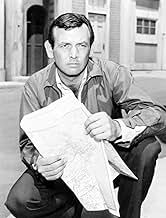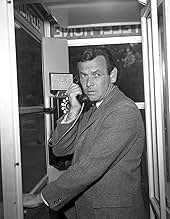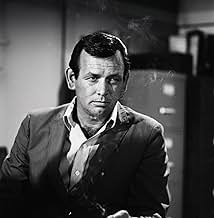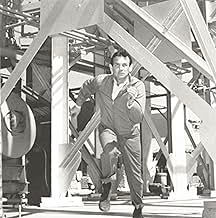After being on the run for 6 months, Richard Kimble falls in love with a beautiful woman who has a young son. She also has a physically abusive, estranged husband, that wants Kimble out of t... Read allAfter being on the run for 6 months, Richard Kimble falls in love with a beautiful woman who has a young son. She also has a physically abusive, estranged husband, that wants Kimble out of town, or dead.After being on the run for 6 months, Richard Kimble falls in love with a beautiful woman who has a young son. She also has a physically abusive, estranged husband, that wants Kimble out of town, or dead.
Paul Birch
- Captain Carpenter
- (uncredited)
Lynn Borden
- Bus Passenger
- (uncredited)
George Bruggeman
- Bar Patron
- (uncredited)
William Conrad
- Narrator
- (voice)
- (uncredited)
Dabbs Greer
- Sgt. Fairfield
- (uncredited)
Donald Losby
- Mark Welles
- (uncredited)
Rod McGaughy
- Bar Patron
- (uncredited)
Bryan O'Byrne
- Ticket Agent
- (uncredited)
Barney Phillips
- Cleve Brown
- (uncredited)
Maudie Prickett
- Miss Blaine (the babysitter)
- (uncredited)
Abigail Shelton
- Evelyn
- (uncredited)
Carl Sklover
- Bar Patron
- (uncredited)
Dick Wesson
- Introductory Narrator
- (voice)
- (uncredited)
- Director
- Writers
- All cast & crew
- Production, box office & more at IMDbPro
Featured reviews
10zentners
I grew up watching The Fugitive, but did not see the first episode of this superb series until years later. It's incredibly suspenseful, right from the start...beginning with William Conrad's opening narration which dances perfectly with David Janssen's always subtle body language. The musical score augments the tension in every scene.
In this first episode, which is my personal favorite, Kimble is working as a bartender in a Tucson nightclub under the pseudonym, Jim Lincoln. Vera Miles, who portrays a depressed pianist there, becomes understandably attracted (as do most women in the series) to our shy though always supportive hero. The problem is that she's being stalked by her estranged, though possessive cowboy husband, performed perfectly by Brian Keith...who also owns half the state and apparently has significant influence with the local police.
Being a physician with keen clinical acumen, Kimble is quick to pick up on the husband's dangerous paranoia, but is confronted with an internal moral conflict to flee in the interest of self-preservation versus to stay out of Hippocratic devotion to the desensitized pianist and her son. This turns out to be a recurring theme throughout the series, and exemplifies just how much doctors were deified in those days. Ultimately, there is a climactic and unnerving confrontation between Kimble and the psycho husband. (Janssen actually broke a couple of ribs in this scene, which is a testimony to its realism.)
In the epilogue, Phillip Gerard, "the police lieutenant obsessed with his capture" (as he is described in the opening credits), interrogates Miles' character on the whereabouts of Kimble. Now convinced of his innocence regarding the murder of his wife, she provides no clues to the perennially frustrated Gerard.
At the end of Fear in a Desert City, the viewer is left with mixed feelings of relief and sympathy for the good doctor, as well as a compulsive desire to follow Dr. Richard Kimble's plight to its end...4 years and 120 episodes later.
In this first episode, which is my personal favorite, Kimble is working as a bartender in a Tucson nightclub under the pseudonym, Jim Lincoln. Vera Miles, who portrays a depressed pianist there, becomes understandably attracted (as do most women in the series) to our shy though always supportive hero. The problem is that she's being stalked by her estranged, though possessive cowboy husband, performed perfectly by Brian Keith...who also owns half the state and apparently has significant influence with the local police.
Being a physician with keen clinical acumen, Kimble is quick to pick up on the husband's dangerous paranoia, but is confronted with an internal moral conflict to flee in the interest of self-preservation versus to stay out of Hippocratic devotion to the desensitized pianist and her son. This turns out to be a recurring theme throughout the series, and exemplifies just how much doctors were deified in those days. Ultimately, there is a climactic and unnerving confrontation between Kimble and the psycho husband. (Janssen actually broke a couple of ribs in this scene, which is a testimony to its realism.)
In the epilogue, Phillip Gerard, "the police lieutenant obsessed with his capture" (as he is described in the opening credits), interrogates Miles' character on the whereabouts of Kimble. Now convinced of his innocence regarding the murder of his wife, she provides no clues to the perennially frustrated Gerard.
At the end of Fear in a Desert City, the viewer is left with mixed feelings of relief and sympathy for the good doctor, as well as a compulsive desire to follow Dr. Richard Kimble's plight to its end...4 years and 120 episodes later.
The first episode of this long-running Quinn Martin television production showcases many of the reasons why it was so successful for so long. Well-written, tautly directed and with a strong cast delivering solid performances, it was fraught with tension from first to last.
It employs the familiar QM template of breaking down the narrative to four roughly equal twelve-minute acts with a short concluding epilogue, normally to set up the next episode. Interestingly and surprisingly for this introduction and unlike the much later feature film which starred Harrison Ford and Tommy Lee Jones, there's no scene-setting opening scene. We don't see the killing of Kimble's wife, far less get a glimpse of the one-armed man he says (and I believe him!) he bumped into at the sequence. It simply starts with the train crash which separates him from his Inspector Javert-like nemesis, Barry Morse's Lt. Gerard.
Escaping to Tuscon, with a change of name and hair colour, Kimble tries to blend into the background until he can get a lead on the real killer but on getting a job as a lowly bartender, he soon gets drawn into a domestic situation involving Vera Miles' single parent pub-pianist, on the run from her jealous and violent ex-husband, played with some devilment by Brian Keith.
It ends as all future episodes must end, with Kimble losing the girl and leaving town, but not before righting wrongs and putting certain situations right and in this particular even signposting intra-marital coercive male behaviour when it was probably less highlighted than it is now.
Jansen is immediately convincing in his character and is well supported by Miles, late of major Hollywood parts , while the direction amply and skilfully draws out the story thanks to an excellent script and some atmospheric noir-esque camera set-ups.
I very much doubt I'll get to watch in my lifetime all the succeeding 119 intervening programmes until the final showdown, as I think it would take Kimble-like devotion on my part to do so, but it was nevertheless cool to check in on the very first episode of such an iconic series.
It employs the familiar QM template of breaking down the narrative to four roughly equal twelve-minute acts with a short concluding epilogue, normally to set up the next episode. Interestingly and surprisingly for this introduction and unlike the much later feature film which starred Harrison Ford and Tommy Lee Jones, there's no scene-setting opening scene. We don't see the killing of Kimble's wife, far less get a glimpse of the one-armed man he says (and I believe him!) he bumped into at the sequence. It simply starts with the train crash which separates him from his Inspector Javert-like nemesis, Barry Morse's Lt. Gerard.
Escaping to Tuscon, with a change of name and hair colour, Kimble tries to blend into the background until he can get a lead on the real killer but on getting a job as a lowly bartender, he soon gets drawn into a domestic situation involving Vera Miles' single parent pub-pianist, on the run from her jealous and violent ex-husband, played with some devilment by Brian Keith.
It ends as all future episodes must end, with Kimble losing the girl and leaving town, but not before righting wrongs and putting certain situations right and in this particular even signposting intra-marital coercive male behaviour when it was probably less highlighted than it is now.
Jansen is immediately convincing in his character and is well supported by Miles, late of major Hollywood parts , while the direction amply and skilfully draws out the story thanks to an excellent script and some atmospheric noir-esque camera set-ups.
I very much doubt I'll get to watch in my lifetime all the succeeding 119 intervening programmes until the final showdown, as I think it would take Kimble-like devotion on my part to do so, but it was nevertheless cool to check in on the very first episode of such an iconic series.
I was very surprised tonight when I was looking around on YouTube. This is because I found the unaired pilot episode of "The Fugitive" and while the quality of the print sure ain't great, it was well worth seeing.
When the show begins, there is an extended version of the usual opening scene from the series. This time, William Conrad went into more depth about Richard Kimble and his back story. However, you never see anything about the murder, the murderer or the trial. It starts on the train...and soon it derails and Kimble escapes the Death House.
The first plot of the show involves a woman who has a jealous, angry and violent husband. Monica (Vera Miles) plays piano at the bar where 'Jim Lincoln' (Kimble) works. While he's tending bar, a nasty man seems to be trying to provoke him. It turns out it's Edward Welles (Brian Keith)....Monica's husband. Later, when 'Jim' leaves work, he sees Edward in the parking lot beating the snot out of his wife. Naturally he intervenes and Edward speeds off in his car...nearly hitting them both. What's going to become of this poor lady...and how can Kimble help them, as he's ALWAYS out helping others throughout the series? He's sort of a wanted man and social worker all rolled into one. What makes situation tough, however, is that Edward is involved in politics and he's an important man...and he can make it really tough for 'Jim'.
This is a very good installment of the series...too good not be be seen. Perhaps the network chose not to air it because the ending is VERY dark as well as violent. Well written, well acted and a treat for fans of the series.
When the show begins, there is an extended version of the usual opening scene from the series. This time, William Conrad went into more depth about Richard Kimble and his back story. However, you never see anything about the murder, the murderer or the trial. It starts on the train...and soon it derails and Kimble escapes the Death House.
The first plot of the show involves a woman who has a jealous, angry and violent husband. Monica (Vera Miles) plays piano at the bar where 'Jim Lincoln' (Kimble) works. While he's tending bar, a nasty man seems to be trying to provoke him. It turns out it's Edward Welles (Brian Keith)....Monica's husband. Later, when 'Jim' leaves work, he sees Edward in the parking lot beating the snot out of his wife. Naturally he intervenes and Edward speeds off in his car...nearly hitting them both. What's going to become of this poor lady...and how can Kimble help them, as he's ALWAYS out helping others throughout the series? He's sort of a wanted man and social worker all rolled into one. What makes situation tough, however, is that Edward is involved in politics and he's an important man...and he can make it really tough for 'Jim'.
This is a very good installment of the series...too good not be be seen. Perhaps the network chose not to air it because the ending is VERY dark as well as violent. Well written, well acted and a treat for fans of the series.
While one certainly doesn't have to see the pilot it would add to the impact of the first episode. The basics: Kimball's running from a death sentence by what, indeed, the show calls "fate's big hand" which has given Kimball his escape. The running has a means to its end which is beyond surviving the wrongful death sentence. Kimball is actively looking for the real murderer, the "one-armed man" which he sees as justice for his wife and, now, his own life.
QM Productions have high standards, often inserting top-shelf actors/actresses on their way up. Here it is Vera Miles and Brian Keith. The rest of the cast is also much better than average. Of course to get by Kimball needs to hide his real identity while taking on work. He has chosen the name of Jim Lincoln. Working at a local Tucson neighborhood watering hole as a bartender makes good sense in that he can be relatively anonymous while keeping his eyes and ears open hoping for the miracle of any information on the man with one arm. We are immediately aware of Kimball's character: intelligence, humbleness, and empathy is, perhaps, his achielles heel too in a world where those possessing the opposite traits rise up. Miles plays the role of a wickedly oppressed estranged wife from her wealthy and powerful husband played by Keith. Keith is a very visible stalker seeking out his wife with no regard to the estranged nature of their separation. He is going to have her and if any one comes between that he will do whatever it takes to make sure the person is eliminated. This is exactly the kind of volatile situation Kimball doesn't need as Lt. Gerrard's constant pressure is quite palpable. Even so, the good man who is Kimball inserts himself as Mile's protector and possible love interest all while Kimball knows the later can never be.
This is the winding road beginning for Richard Kimball. One that will repeat many more times in the coming 120 episodes. What keeps it vital is the human element Kimball seems so perfect crafting. He personifies the best of humanity along with his heavy burden of constant fear. Playing this out in what almost seems like a travelog of the very different and impressive locales in the American landscape, along with memorable co-stars and characters, is the final part of a masterpiece of TV drama. In my estimation the best, if not at least, one of the top two or three TV series of all time.
QM Productions have high standards, often inserting top-shelf actors/actresses on their way up. Here it is Vera Miles and Brian Keith. The rest of the cast is also much better than average. Of course to get by Kimball needs to hide his real identity while taking on work. He has chosen the name of Jim Lincoln. Working at a local Tucson neighborhood watering hole as a bartender makes good sense in that he can be relatively anonymous while keeping his eyes and ears open hoping for the miracle of any information on the man with one arm. We are immediately aware of Kimball's character: intelligence, humbleness, and empathy is, perhaps, his achielles heel too in a world where those possessing the opposite traits rise up. Miles plays the role of a wickedly oppressed estranged wife from her wealthy and powerful husband played by Keith. Keith is a very visible stalker seeking out his wife with no regard to the estranged nature of their separation. He is going to have her and if any one comes between that he will do whatever it takes to make sure the person is eliminated. This is exactly the kind of volatile situation Kimball doesn't need as Lt. Gerrard's constant pressure is quite palpable. Even so, the good man who is Kimball inserts himself as Mile's protector and possible love interest all while Kimball knows the later can never be.
This is the winding road beginning for Richard Kimball. One that will repeat many more times in the coming 120 episodes. What keeps it vital is the human element Kimball seems so perfect crafting. He personifies the best of humanity along with his heavy burden of constant fear. Playing this out in what almost seems like a travelog of the very different and impressive locales in the American landscape, along with memorable co-stars and characters, is the final part of a masterpiece of TV drama. In my estimation the best, if not at least, one of the top two or three TV series of all time.
10ynot-16
This, the first episode, is a very fitting beginning to the saga of Dr. Richard Kimble, fugitive. Kimble (using the name Jim Lincoln) takes a job at a bar in Tucson, Arizona, and meets the piano player, Monica Welles, played by actress Vera Miles. Monica is bothered by a male patron of the bar. Kimble repeatedly protects her, thereby acquiring an enemy. He later learns the man bothering her is Ed Welles, her husband. Actor Brian Keith does an outstanding job as Ed.
Ed Welles is a major landowner in the state, with enormous influence over the police. He is also paranoid, jealous, controlling and violent where his wife is concerned. She fled Phoenix to Tucson a month earlier to get away from Ed, but he found her and followed her.
Kimble takes the opportunity to explain his story to Monica, thereby informing viewers about why he is on the run. Due to his impeccable, protective behavior, she of course believes in his innocence. Meanwhile, we see Lieutenant Gerard back in Stafford discussing the case with Captain Carpenter. Carpenter suggests that maybe Kimble is innocent, but Gerard declares it does not matter to him whether Kimble is factually innocent or guilty. The law declared him guilty, and it is not up to Gerard to decide on guilt or innocence, but merely to obey the law and bring in the fugitive.
Child actor Donald Losby (who later plays Sean in "Cry Uncle") plays Monica's son, who at first is cold to Kimble, but later comes to like and trust him more than his own dad.
Actors Harry Townes and Dabbs Greer are very credible as the two police officers whom Ed employs to chase Kimble out of town. Kimble faces severe danger from the police, and from the violent behavior and desire for revenge of Ed Welles.
Ed Welles is a major landowner in the state, with enormous influence over the police. He is also paranoid, jealous, controlling and violent where his wife is concerned. She fled Phoenix to Tucson a month earlier to get away from Ed, but he found her and followed her.
Kimble takes the opportunity to explain his story to Monica, thereby informing viewers about why he is on the run. Due to his impeccable, protective behavior, she of course believes in his innocence. Meanwhile, we see Lieutenant Gerard back in Stafford discussing the case with Captain Carpenter. Carpenter suggests that maybe Kimble is innocent, but Gerard declares it does not matter to him whether Kimble is factually innocent or guilty. The law declared him guilty, and it is not up to Gerard to decide on guilt or innocence, but merely to obey the law and bring in the fugitive.
Child actor Donald Losby (who later plays Sean in "Cry Uncle") plays Monica's son, who at first is cold to Kimble, but later comes to like and trust him more than his own dad.
Actors Harry Townes and Dabbs Greer are very credible as the two police officers whom Ed employs to chase Kimble out of town. Kimble faces severe danger from the police, and from the violent behavior and desire for revenge of Ed Welles.
Did you know
- TriviaThis series was loosely based on Victor Hugo's novel "Les Miserables". The writer of this episode, Stanford Whitmore, has said that he chose the surname "Gerard" for Kimble's pursuer because it sounded similar to "Javert," who pursues Jean Valjean in "Les Miserables".
- GoofsA closeup shot of the train losing control is apparently of a toy train.
- ConnectionsEdited from The Fugitive (1963)
- SoundtracksI'll Never Smile Again
(uncredited)
Written by Ruth Lowe (1940)
[Performed at the Branding Iron bar by Vera Miles' character, Monica Welles]
Details
- Release date
- Country of origin
- Language
- Filming locations
- 7100 block of Willoughby between LaBrea and Romaine, Los Angeles, California, USA(RR tracks in ending scene with kitten and RR crossing sign in ending shot, used in ending credits)
- Production companies
- See more company credits at IMDbPro
- Runtime
- 51m
- Color
- Aspect ratio
- 1.33 : 1
Contribute to this page
Suggest an edit or add missing content



























